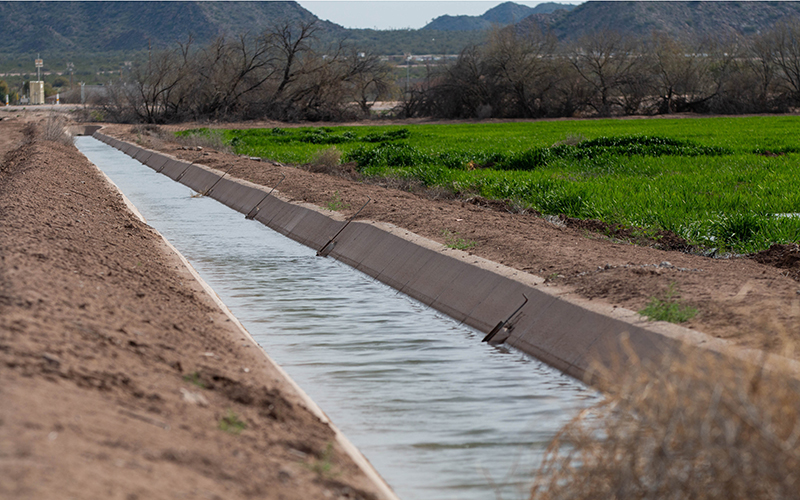
If the water transfer is approved, Queen Creek would use water from the Colorado River, currently owned by GSC Farm, to decrease its dependence on groundwater, a finite source. (Photo by Oskar Agredano/Cronkite News)
PHOENIX – The latest proposal to transfer water from the Colorado River to central Arizona has a fight on its hands.
Queen Creek is trying to buy an annual entitlement to 2,083.1 acre-feet of Colorado River water from a farming and investment company that owns land in Cibola Valley, in far west La Paz County. An acre-foot of water serves a family of four for about one year.
The initial cost would be $10,000 per acre-foot (about $20.8 million in all), but the money may be the easiest part. Getting permission to revise a so-called “fourth priority” entitlement contract between the landowner, GSC Farm, and the federal Bureau of Reclamation is far from simple.
The proposed transfer would change how the water is used, from growing crops to serving homes, and the location of use, from La Paz County to Queen Creek. The water now is used to irrigate about 485 acres near the Arizona-California line. Under the proposal, GSC Farm would sell the water but retain the land, which is different from other recent attempts to transfer water from rural counties to central Arizona.
Arizona will make a recommendation to the federal government, but it’s ultimately the Bureau of Reclamation’s decision to allow or reject the revisions.
Getting off groundwater
Queen Creek would use surface water from the Colorado to decrease its dependence on groundwater, a finite source. The town’s planning area spans Maricopa and Pinal counties, and it has a current annual demand of 15,100 acre-feet. The vast majority of that demand is met with groundwater.
According to documents on the proposed transfer, the town estimates future annual demand will reach 43,500 acre-feet. In addition to the river water it’s seeking, Queen Creek hopes to add 12,100 acre-feet of non-groundwater supplies.
“We’re not going to try to use this water and then pump more groundwater,” said the town’s utility services director, Paul Gardner. “It’s to continue to reduce and reduce and over the long term, to get it down to where our pumping of groundwater, out of 43,000 acre-feet, is about 5,000 acre-feet on an annual basis.”
GSC Farm is a limited liability company owned by Greenstone, which has investments in farmland and water resources in the western United States.
A fight for economic opportunity
Communities up and down the river broadly oppose water transfers, and this one is no different. They see it as a slippery slope that will hurt their own future development.
State Rep. Regina Cobb, a Republican who represents La Paz County, said approval of the transfer would lead to a “civil war” in Arizona.
“Companies are free to invest in rural Arizona, and I do welcome all their investments,” she said at a public meeting in mid-November at the Arizona Department of Water Resources. “But I do not welcome their investments just to transfer water into central Arizona.”
Jamie Kelley, the general counsel for the Mohave County Water Authority, called the proposal a threat to the existence of rural communities along the river.
“It becomes a transfer of wealth because it becomes a transfer of the economic opportunity,” she said.
Others promised to fight the proposal every step of the way.
Grady Gammage Jr., a lawyer for GSC Farm, said there is plenty of water for on-river communities to grow, especially if water that’s currently used for agriculture is included.
“The existing river communities only use about 40% of their existing municipal supply,” he said. “Beyond that, they can engage in the kinds of transactions that we’re engaging in here, which is to move water up and down the river to urban locations and could engage in transactions like this that retire farmland.”
Four public comment sessions have been held this month. The Department of Water Resources will take public comments until Dec. 16 and make a recommendation to the Bureau of Reclamation 60 days after that, barring any extension.
If at first you don’t succeed
Recent attempts to lease or shift water from the mainstem into central Arizona have failed.
In 2018, the Arizona Department of Water Resources came out against a proposed lease between Quartzsite and the agency that runs the Central Arizona Project. The CAP would have leased 1,070 acre-feet of water from Quartzsite for groundwater replenishment in the middle of the state.
Also last year, the CAP walked away from a plan to buy about 2,000 acres in Mohave County, which would have given the CAP’s replenishment arm access to thousands of acre-feet of river water.
Using surface water to replenish pumped groundwater allows new home builders to comply with state regulations requiring an assured 100-year supply in Maricopa, Pinal, Pima, Santa Cruz and Yavapai counties.
This story is part of Elemental: Covering Sustainability, a new multimedia collaboration between Cronkite News, Arizona PBS, KJZZ, KPCC, Rocky Mountain PBS and PBS SoCal.